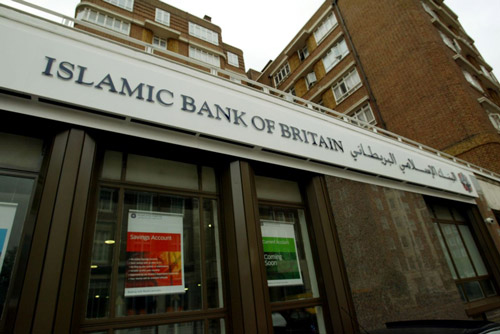London, 15 Rajab 1436/4 Mei 2015 (MINA) – Amid increasing support for Islamic finance, Shari’ah-complaint bank instruments have been gaining ground in the UK, with upsurge in its popularity among non-Muslims as well, British financial experts revealed.
“Non-Muslim customers are attracted to Islamic finance because of the ethical way we conduct our business and also our approach to customer service,” Tim Sinclair, the head of marketing and retail sales at Al Rayan Bank said, On Islam quoted by Mi’raj Islamic News Agency (MINA) as reporting.
“Islamic finance appeals to those who agree with the underlying principles of equitable distribution, fair trading, prudent spending and the well-being of the community as a whole.”
Sinclair believes that the ethical criteria of Islamic financial system are the main reason behind its growth among non-Muslim communities in the UK.
Also Read: Hundreds Rally in Stockholm to Condemn Israeli Attacks and Ceasefire Violations in Gaza
Adopted by the UK three decades ago, products of Islam finance range from Islamic savings accounts, investments, mortgages and insurance policies to Shari`ah-compliant student loan.
“Deposits are invested in asset- based, relatively secure commodities such as property or metals,” Sinclair said.
“They are never invested in any activity not in keeping with the values of Islam, such as any activity connected to gambling, alcohol, pornography, arms, tobacco or any interest-bearing activity – or any speculative activity.”
For Mohammad Khan, head of Islamic finance at PricewaterhouseCoopers (PwC), “ethical concerns” are not the main reason of interest in Shari`ah-compliant products.
Also Read: Mass Protests Erupt in Bologna Against Israeli Teams Ahead of EuroLeague Match
“If you look at the most developed market for Sharia-compliant products, it’s Malaysia. And if you look at the people investing in those products, they range from Muslims to non-Muslims – but people are simply investing in the most competitive products at the time.”
Last September, the UK government has approved new Shari’ah-complaint loans for Muslim students, to help students overcome the latest rise in education fees.
Growth
Reflecting the growth of the Islamic finance in the UK, Al Rayan Bank posted a profit for the first time in 2014, showing its operating income rocketing by 168% increase.
Also Read: Finland’s Largest Retailer Halts Israeli Product Sales
The growth of the bank was mainly driven by non-Muslims, according to Sinclair.
“We estimate that 83 per cent of our fixed-term deposit savings customers and 47 per cent of our Isa customers who joined the bank last year were non-Muslim,” Sinclair said.
Islam forbids Muslims from receiving or paying interest on loans.
Islamic banks and finance institutions cannot receive or provide funds for anything involving alcohol, gambling, pornography, tobacco, weapons or pork.
Also Read: 1,000th Western Military Supply Plane Lands in Israel Since Gaza War
“As an Islamic bank, we are not allowed to charge arbitrary fees to our customers. Our charges only ever reflect the time and effort that our employees have put in, which typically make them lower than charges made by conventional banks,” Sinclair said.
Islamic banks have proved a success because of the rules that forbid investing in collateralized debt obligations and other toxic assets that cause financial crises.
The Islamic banking system is being practiced in 50 countries worldwide, making it one of the fastest growing sectors in the global financial industry.
Starting almost three decades ago, the Islamic banking industry has made substantial growth and attracted the attention of investors and bankers across the world.
Also Read: Harvard Builds Archive of Israeli Life, Preparing for “May Not Survive”
Shari`ah-compliant products could be verified through two key tests, “there has to be no interest involved and it has to be extremely transparent,” Khan explained.
“It has to be really clear where all the fees are,” he added.
“To qualify, a Sharia board has to sign it off; that’s where at least three Islamic scholars look at the product, its marketing, its terms and conditions, and its fees.
“It’s essentially an independent audit done by an independent body.
Also Read: German Opposition Party Urges End to the Suppression of Pro-Palestinian Movement
“I would describe it as an ethics audit.” (T/P006/R04)
Mi’raj Islamic News Agency (MINA)
Also Read: Palestinian Football Team Plays Historic Friendly in Spain Amid Solidarity Display

































 Mina Indonesia
Mina Indonesia Mina Arabic
Mina Arabic